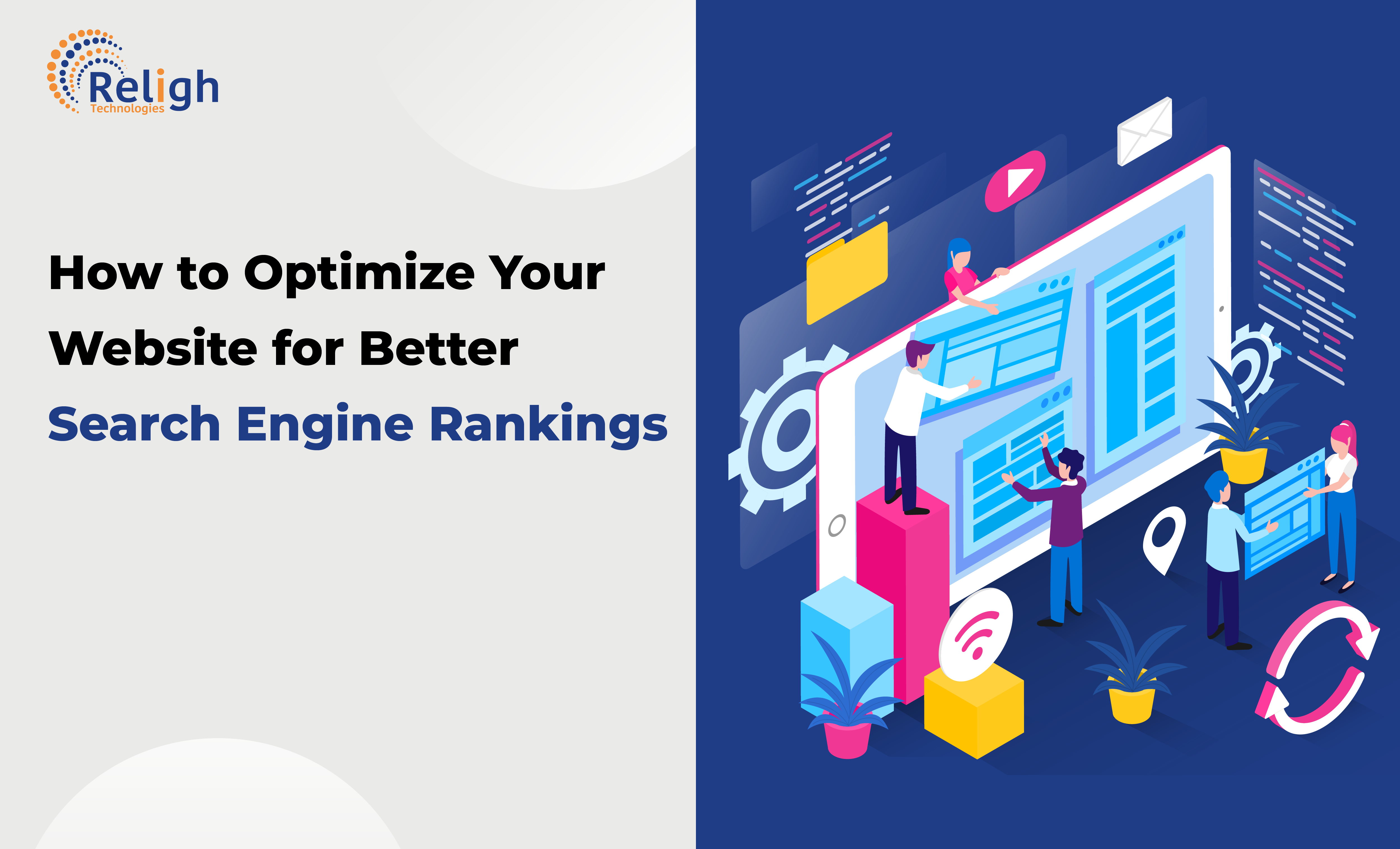The world is evolving and so do business territories. In this digitally fast moving era, having a strong online presence is crucial for the success of any business. And when it comes to online visibility and success, search engine rankings play a significant role.
How? The answer is through optimization!
Optimising your website for better search engine rankings is not only important but a must-have strategy if you want to attract more organic traffic and reach your target audience.
In this article, we will explore the reasons why optimising your website is important and the benefits it can bring to your online business. If you are in Bangalore, partnering with an SEO Company in Bangalore can be particularly advantageous in this endeavour.

Keyword Research: The Foundation of SEO
Keyword research plays a crucial role in improving your website’s search engine rankings. Do you know that 94.74% of keywords get 10 monthly searches or fewer out of which only 0.0008% of keywords get more than 100,000 monthly searches.
By identifying and targeting the right keywords, you can attract more organic traffic and reach your target audience effectively. Here is how you can find relevant keywords for your website:
- Understand Your Target Audience: Begin by identifying your target audience and understanding their preferences, needs, and search queries. This will help you choose keywords that are relevant to their interests.
- Use Keyword Research Tools: Utilise keyword research tools such as Google Keyword Planner, SEMrush, or Ahrefs to generate keyword ideas. These tools provide insights on search volume, competition, and related keywords, helping you narrow down your choices.
- Focus on Long-Tail Keywords: Long-tail keywords are specific phrases that target a narrower audience. They usually have lower competition and higher conversion rates. Incorporate long-tail keywords into your content to attract more qualified traffic.
On-Page Optimisation
On-page optimisation involves optimising various elements of your website to improve its visibility on search engines. Here are some essential aspects of on-page optimisation:
- Optimising Meta Tags: Include your target keyword in the title, description, and meta tags of each page. This helps search engines understand the context of your content and rank it accordingly.
- Optimising Headers, Content, and Images: Structure your content with relevant headers (H1, H2, etc.) and use your target keywords naturally throughout the content. Additionally, optimise your images by adding ALT tags and reducing their file sizes to improve page loading speed.
- Using Internal Links and Anchor Text: Internal links help search engines discover and navigate your website. Add relevant internal links within your content using anchor text that includes keywords for better visibility.
Off-Page optimisation: Building Authority and Trust
Off-page optimisation focuses on improving the visibility and reputation of your website outside of its own domain. Here are some key strategies for off-page optimisation:
- Building High-Quality Backlinks: Acquiring high-quality backlinks from reputable websites can significantly boost your search engine rankings. Focus on obtaining backlinks from relevant sources that have a high domain authority.
- Social Media Integration: Active social media presence and integration can help amplify the reach of your content and attract more visitors to your website. Share your content, engage with your audience, and encourage social sharing.
- Guest Blogging and Influencer Marketing: Collaborating with influencers or contributing guest posts to authoritative websites within your industry can help you gain exposure, build credibility, and attract quality backlinks.
Technical SEO: Enhancing Your Website’s Performance
Technical SEO involves optimising the infrastructure and technical aspects of your website to ensure smooth user experience and search engine crawlability. Here are some important technical SEO practices:
- Optimising Website Speed: A fast-loading website is crucial for both user experience and search engine rankings. Compress images, minify CSS and JavaScript files, and utilise caching techniques to improve your website’s loading speed.
- Mobile optimisation: With the majority of internet users accessing websites through mobile devices, optimising your website for mobile responsiveness is essential. Ensure your website is mobile-friendly and provides a seamless experience across different screen sizes.
- Fixing Broken Links and Crawl Errors: Broken links and crawl errors can negatively impact your website’s performance and user experience. Regularly monitor and fix broken links and crawl errors to maintain a healthy website structure.
- Creating XML Sitemaps: XML sitemaps help search engines understand the structure and content of your website. Create and submit XML sitemaps to search engines to ensure all your pages are discovered and indexed efficiently.

User Experience (UX) optimisation
When users have a positive experience while navigating your website, it signals to search engines that your website is valuable and relevant.
- Improving website navigation and accessibility
- Reducing bounce rates
- Ensure that your website loads quickly. Users are more likely to leave if a website takes too long to load.
- Improve the readability of your content. Use clear and concise language, break up text with bullet points or numbered lists, and include relevant visuals
- Incorporate internal links within your content to encourage users to navigate to other pages on your website.
- Optimising for mobile devices
- Use a responsive design that adjusts seamlessly to different screen sizes.
- Optimise images and videos for mobile devices to ensure faster loading times.
- Prioritise important content and ensure it is easily accessible on smaller screens.
- Test your website’s mobile responsiveness across different devices and platforms.
A well-designed and easy-to-navigate website attracts more users and keeps them engaged. Ensure that your website’s navigation is intuitive and logical, allowing visitors to find the information they’re looking for effortlessly. Organise your content with clear headings and subheadings, making it easy for users to scan through your website. Moreover, accessibility is another important aspect to consider.
Make sure your website is accessible to all users, including those with disabilities. Ensure that your website follows accessibility guidelines such as proper alt text for images, clear colour contrasts, and keyboard navigation options. For expert guidance on optimising your website’s design and accessibility, consider partnering with the Best SEO Company for the best results.
Bounce rate refers to the percentage of users who leave your website after viewing only one page. A high bounce rate signals to search engines that your website may not be providing the information users are looking for. To reduce bounce rates:
With the majority of internet users browsing on mobile devices, it is crucial to optimise your website for mobile users. A mobile-friendly website not only improves user experience but also helps in achieving better search engine rankings. Here are some tips for optimising your website for mobile devices:

Content Strategy
High-quality, valuable content is the cornerstone of any successful SEO strategy. Search engines prioritise websites that provide relevant and informative content to users. Here are some tips for developing a content strategy to boost your search rankings:
- Importance of high-quality, valuable content
- Incorporating relevant keywords into content
- Creating engaging and shareable content
- Use attention-grabbing headlines and subheadings.
- Include visuals such as images, infographics, and videos.
- Write in a conversational and engaging tone.
- Encourage social sharing by including social media sharing buttons.
Creating high-quality, valuable content should be the primary focus of your content strategy. Aim to provide unique and informative content that addresses the needs and queries of your target audience. By offering valuable content, you increase the chances of your website being shared and linked to by other reputable websites, which further improves your search engine rankings.
Keywords play a vital role in SEO. Identify relevant keywords and incorporate them naturally into your content. However, avoid keyword stuffing, as it can lead to a negative user experience and harm your search engine rankings. Instead, focus on creating informative and engaging content that naturally incorporates relevant keywords.
Engaging content is more likely to be shared and linked to by users, which can significantly improve your search engine rankings. To create engaging content:

Analytics and Measurement
To effectively optimise your website for better search engine rankings, it is essential to track and measure your SEO efforts. This allows you to identify areas of improvement and make data-driven decisions. Here are some aspects you should focus on:
- Setting up Google Analytics
- Analysing website traffic and user behaviour
- Monitoring keyword rankings and SEO performance
Google Analytics is a free tool that provides valuable insights into your website’s performance. Set up Google Analytics and ensure that it is correctly integrated into your website. This will help you track key metrics such as website traffic, bounce rates, user behaviour, and conversions.
Regularly analyse your website’s traffic and user behaviour using Google Analytics. This allows you to understand how users are interacting with your website and identify any areas of improvement. Look for patterns and trends in user behaviour and make adjustments to optimise their experience accordingly.
Monitor your keyword rankings and SEO performance to evaluate the effectiveness of your optimisation efforts. Use tools like Google Search Console or third-party SEO software to track keyword rankings and identify opportunities for improvement. Make optimisations based on the data to boost your search engine rankings.
Local SEO optimisation
Do you know that 97% of consumers find out more online than anyplace else about a local business. One of the first steps in optimising your website for better search engine rankings is to focus on local SEO. Local SEO is the process of optimising your website for local search results, making it easier for local customers to find your business online. Here are a few key aspects to consider for local SEO optimisation:
- Setting up and optimising Google My Business
- Consistent NAP information
- Getting positive online reviews
Google My Business is a free tool provided by Google that allows you to manage your online presence across various platforms, including Google Search and Maps. By setting up and optimising your Google My Business listing, you can increase your chances of appearing in local search results. Make sure to provide accurate and up-to-date information about your business, including your address, phone number, business hours, and website URL.
NAP stands for Name, Address, and Phone number. It is crucial to have consistent NAP information across all online platforms. Inaccurate or inconsistent NAP information can confuse search engines and potential customers. Ensure that your NAP information is the same on your website, Google My Business listing, social media profiles, and other online directories. This consistency will help search engines understand your business’s location and improve your overall search engine rankings.
Online reviews are not only beneficial for gaining trust from potential customers but also for improving your website’s search engine rankings. Encourage your satisfied customers to leave positive reviews on platforms like Google My Business, Yelp, and Facebook. Search engines value businesses with a high number of positive reviews, making it more likely for your website to appear higher in search results.
Conclusion
Optimising your website for better search engine rankings is an ongoing process. By implementing the right strategies and focusing on local SEO optimization, you can improve your website’s visibility and attract more organic traffic. Remember to set up and optimise your Google My Business listing, ensure consistent NAP information, and cultivate positive online reviews.
These efforts will not only boost your search engine rankings but also enhance your overall online presence. Start optimising your website today and reap the benefits of increased visibility and organic traffic with professional SEO Services In Bangalore to enhance your local SEO efforts.

